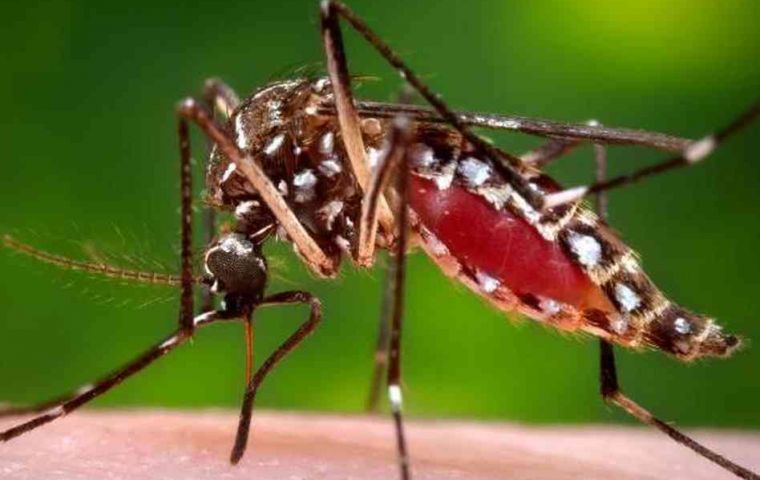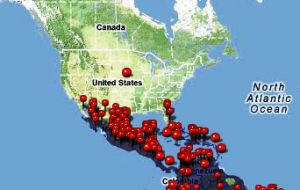MercoPress. South Atlantic News Agency
Warnings of 'catastrophic' Chikungunya epidemic; fears it could spread during the World Cup
 The virus is transmitted by the same dengue Aedes aegypti mosquito
The virus is transmitted by the same dengue Aedes aegypti mosquito  Chikungunya was first reported last December in St. Martin and now has spread to nine additional Caribbean countries
Chikungunya was first reported last December in St. Martin and now has spread to nine additional Caribbean countries A team of French and Brazilian researchers warn that chikungunya virus is poised to invade, and become epidemic in the Americas according to research published ahead of print in the Journal of Virology.
The risk of a “catastrophic” epidemic in the Americas is boosted by the coming FIFA World Cup, to be held in Brazil next month, what with people coming in from near and from far, says corresponding author Ricardo Lourenco-de-Oliveira of the Instituto Oswaldo Cruz in Rio de Janeiro, Brazil. Brazil annually reports the highest incidence of dengue, a virus that is transmitted by Aedes aegypti and Aedes albopictus, the same mosquitoes that transmit chikungunya, he warns.
The basis of his worries is the study, in which he and his collaborators compared the ability of 35 populations of the two Aedes species to transmit three different genotypes of chikungunya. These populations ranged all over the Americas from Buenos Aires to Tyson, Missouri (near St. Louis.) Even in temperate Missouri, A. albopictus was found to have a high dissemination and transmission ability for two of the three chikungunya genotypes.
Chikungunya can cause severe joint pain, which can sometimes lead to permanent disability, according to the US Centers for Disease Control and Prevention. Mortality has been known to reach 1/1000. The virus’ name reflects the condition of many of the stricken, “bent down or become contorted,” in the Tanzanian Makonda language.
Transmission of chikungunya was first reported in the Americas in December of last year, on the Caribbean island of St. Martin. By February 5th, the disease had spread to nine additional Caribbean countries.
“The danger of chikungunya virus spreading all over the tropical, subtropical, and even temperate regions of the Americas is a risk greater than ever,” says Lourenco-de-Oliveira. “Our results showed that the [Americas are] very receptive and vulnerable to CHIKV [chikungunya virus] transmission, and extremely exposed to the occurrence of an immediate chikungunya epidemic, since most regions are highly infested with both vectors.




Top Comments
Disclaimer & comment rules-

-

-

Read all commentsFrom reading this article then, is one to conclude that the disease coinciding with a huge influx of visitors from around the globe, has a potential to spread very quickly to all regions of the world, and spread further from there?
Apr 16th, 2014 - 04:58 am 0No wonder health authorities are alarmed.
Mind you, if the airports aren't ready anyway, and high crime targeting tourists, visitor numbers will not be as high as expected.
Put's a whole new meaning on “Take a little of Brazil back home with you”.
Apr 16th, 2014 - 10:55 am 0@1 Troy
Apr 16th, 2014 - 03:18 pm 0Indeed. In fact the world is way overdue for some sort of pandemic, which is why whenever a new strain of a virus (swine flu/bird flu/SARS), the WHO tend to go a bit overboard.
Normally there is a pandemic every 30-40 years or so. The last true pandemic (which killed over 50 million people worldwide) was the Spanish flu strain that hit in 1918, although the H1N1 strain of flu was declared a pandemic because it affected people in over 206 countries and caused over 6,000 deaths around the world. It fortunately didn't have the impact of the 1918 event, probably due to better understanding of how disease spreads, the use of influenza vaccines, anti-virals, and better medical care added to modern technology making it easier to get Public Health messages out.
Lets hope that this disease doesn't spread.
Commenting for this story is now closed.
If you have a Facebook account, become a fan and comment on our Facebook Page!